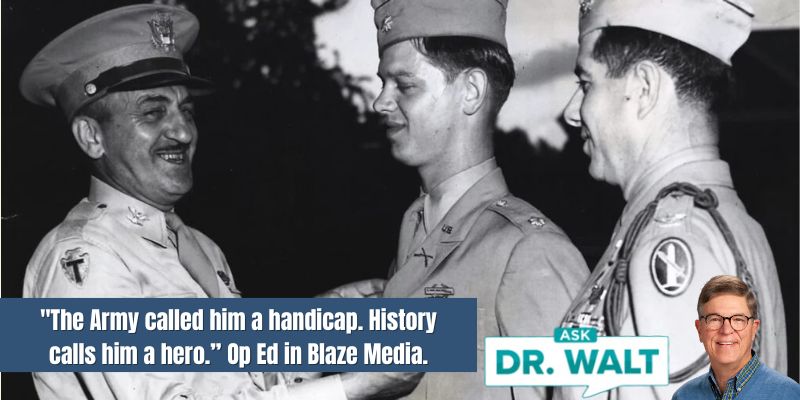
January 30-31, 1945 — Finally, light at the end of the Colmar Pocket tunnel
January 30, 2025
Walt and Barb’s Family Update — February 2025
February 1, 2025Jumping off at 0100 hours on February 1, the 1st and 3rd Battalions [of the 30th Infantry Regiment] attacked under the advantage of “artificial moonlight”[1] through the heavily wooded Bois de Biesheim and Schaeferwald Forest [in the Colmar Pocket].[2]

The men overcame heavy small arms fire, but both attack battalions took heavy casualties from tree bursts of 120-mm mortars firing from positions east of the Rhine River.
At 0200 hours on February 1, the L Company commander got hit during a fierce firefight as the company was subjected to heavy artillery, Flakwagen, mortar, machine gun, and rifle fire.
Phil was sent up to take his place and assume command. He had been waiting the entire war to command a front-line company, but he had two major concerns as he went to meet his men.
He was aware that many GIs at the front believed that after any man was seriously wounded, he was never as good in combat again, which automatically meant his men were suspicious of him. Phil didn’t think this would be true in his case, but he understood the sentiment.
Furthermore, he was also cautious because Love Company was the most storied in the regiment and had been led by superior officers.
Although he would be their youngest commander ever[3] and knew he had big shoes to fill,[4] he felt calmer and more prepared than ever before.
Upon Phil’s arrival, he quickly saw that the company was frozen in place by the sub-freezing temperatures and withering enemy fire. Phil feared that acute combat fatigue had set in since many men were reliving their Maison Rouge horrors.
The new commander quickly reorganized the shaken company, moving from platoon to platoon. Working with his FO, Phil organized a blistering artillery barrage, followed by leading his men from tree to tree through the thick woods while under steady artillery, mortar, and heavy small arms fire.
They cleared 3,000 yards of ground in record time, killing scores of the enemy with no American losses.
At one point, about forty German soldiers began a fanatical and what-appeared-to-be suicidal attack toward Company L, but small arms, artillery, and mortar fire stopped and dispersed them, allowing the company to capture even more German POWs.
The expressions on the prisoners’ faces ranged from anger and exhaustion to relief. In one stomach-turning episode, a German SS officer about to be taken prisoner grabbed a grenade, held it against his body, and shouted, “Heil Hitler!” before blowing himself apart.
~~~~~
[1] Artificial moonlight referred to the placement of powerful searchlights 4,000 to 6,000 yards behind the front line, adjusted to reflect off the low clouds to give light equal to that of a half-moon which aided in detecting and defeating German patrols. Since the Germans faced the light source, it did not aid them as much as the GIs, who had their back to the light source. Furthermore, even in diffused light, a considerable shadow effect was produced on the far side of hedges, tanks, and houses. From the concealment of these shadows, Allied troops could more easily observe German troops and installations.
[2] Larimore, At First Light, 202.
[3] Phil had just turned 20 years old and was a 1st Lieutenant. As far as I can tell, he was the youngest Company Commander in the Army during WWII. According to available information in 2025, the average age of an Army company commander in World War II was around 28-29 years old with a Captain rank.
[4] In Italy, Company Love had been led by Captain Maurice L. “Footsie” Britt, who had been awarded the Medal of Honor, the Distinguished Service Cross, a Silver Star, Bronze Star, and a Purple Heart. Captain Britt wrote Phil’s parents, “You can bet your life that he really has something on the ball to be to be placed in command of a company and be as young as he is. He also has a nice collection of medals.” He added, “Company L is my first and last love in the Army and I am pleased that the Company has such a capable commander.” Britt had played professional football for the Detroit Lions in 1941 before entering active service. He was the first recipient of the top four combat decorations for valor awarded to an Infantryman by the US Army during World War II (the MOH, DSC, SS, and PS) and later served as Lieutenant Governor of Arkansas.

[4] Larimore, Ibid.
In case you haven’t read or listened to Dad’s book, you can learn more or order it here.
© Copyright WLL, INC. 2025.


